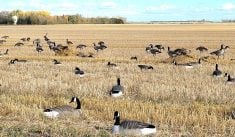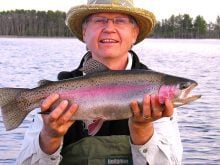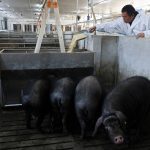With her love of rural life and penchant for the problem solving needed to treat many types and sizes of animals, Manitoba-born veterinary student Nyssa Guilbert says she hopes to work in a country practice once she graduates.
“It’s just kind of like what I’ve always known and what I’ve always loved,” said the Anola-area future veterinarian.
Why it matters: Veterinarian shortages, particularly in large animal practice, are a concern throughout the Prairies.
Read Also

VIDEO: Manitoba’s Past Lane – Jan. 31
Manitoba, 1946 — Post-war rations for both people and cows: The latest look back at over a century of the Manitoba Co-operator
It will now be a little easier financially for her to achieve that dream.
Guilbert is the inaugural winner of the Guy Hobman Award handed out by the University of Saskatchewan’s Western College of Veterinary Medicine.
The scholarship was created in memory of Manitoba businessman and animal lover Guy Hobman, who died in 2017. It pays for the first two years of tuition at the college for a first-year Manitoban student, a value of more than $30,000.
The college is the main source of training for Manitoba’s veterinary hopefuls.
Meet the winner
Guilbert describes herself as someone who “doesn’t win things,” according to an article on the university’s website.
“I instantly called my mom to let her know because [my parents] were rooting for me the whole time. It was a weight off my shoulders when I found out,” she told the university. “I’m really grateful about the experience. It’s amazing. It’s just a very generous donation.”
For her, veterinary school is the next step on a years-long journey of loving and helping animals — a journey that began with Guilbert’s own first steps that she took with help from the family basset hound, Daisy.
“She was the perfect height when I was learning to walk and would help me get around the house faster,” Guilbert said in an interview.
The future veterinarian grew up on an acreage near Anola with various other dogs (Sandy and Pepe le Pew among them). The family also kept cats, including Fred the Second, who was her “rock” from Grade 3 to her second year of university.
“I knew I needed to be in some sort of field involving animals,” Guilbert said. “Also, growing up, I was very interested in … puzzles and problem solving … I also fell in love with the concept of medicine.”
While her peers were squeamish or even fainted during animal dissections in high school, Guilbert found them fascinating. But getting into vet school wasn’t easy. The waitlist is infamously long.
In a 2022 comment to the Co-operator, the Western College of Veterinary Medicine estimated that it receives three applications for every seat reserved for Manitoba students. Until recently, the school reserved seats for 15 Manitobans per year. A funding boost from the province, announced late last year, boosted the annual number to 20.
After high school, Guilbert completed a bachelor degree in biology and, when she wasn’t accepted into veterinary school right away, nearly finished a second degree in environmental science.
“I’m going to get somewhere I want to be eventually,” Guilbert said. “I’m definitely not a quitter.”
While waiting, Guilbert sought all the veterinary experience she could by volunteering with Wildlife Haven Rehabilitation Centre in Ile des Chênes, which treats sick and injured wild animals. On her third try, she was accepted into the veterinary college.
This summer, Guilbert is interning at a vet clinic in Neepawa, where she says she’s gaining valuable experience and mentorship. She has already treated everything from a sick budgie to a cow with a prolapsed uterus.
It’s this kind of mixed practice Guilbert says she’s drawn to — dogs and cats interspersed with trips to farms.
“It’s nice to get out of the clinic and get some fresh air, and then I just really love interacting with the farmers,” she said.
She has also seen how difficult the work can be. Manitoba has a shortage of veterinarians, so the clinic is always busy. She has had to learn while working at full speed, and says she now sees how burnout could be a problem.
“If you’re a little late to an appointment, it’s not because you’re lazy. It’s more of the fact that we are trying very much, just trying our best and trying to balance everything,” she said.
The feeling that she has helped someone makes the job worthwhile, “even if something minor, even if it’s just like a nail trim. I know how my dog is with a nail trim. I just feel like I made someone’s day by doing it for them.”
















